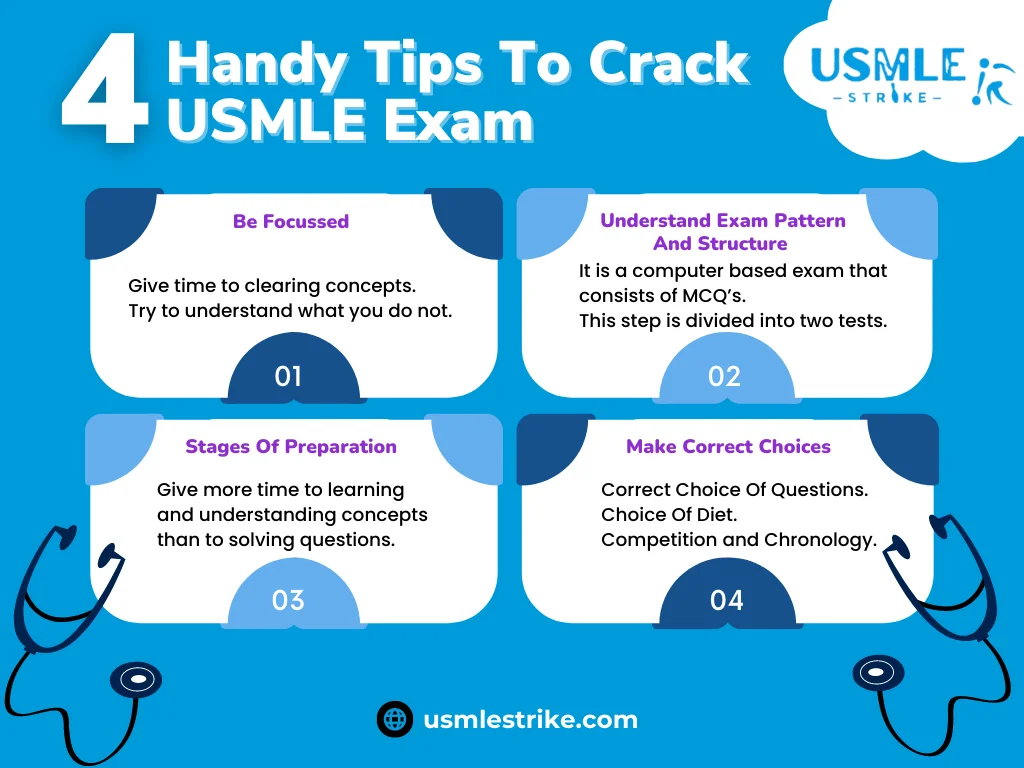The United States Medical Licensing Examination (USMLE) is a three-tier exam that is designed to provide a medical license to practice medicine in the United States. It is sponsored by the Federation of State Medical Boards (FSMB) in partnership with the National Board of Medical Examiners (NBME), it assesses candidates based on the comprehensive USMLE Exam Syllabus, ensuring readiness for medical practice in the United States.
USMLE Step 1, Step 2, and Step 3 are the 3 levels of the USMLE exam. The USMLE Step 2 selection process has been categorized into two: Clinical Knowledge (CK). The USMLE Step 3 examination is available only for candidates who have cleared Steps 1 and 2. To clear all the stages of the exam, a candidate should be aware of the USMLE exam details prior.
USMLE Exam Syllabus
The current med students or those who have graduated from a medical school recently under the recognition of the World Directory of Medical Schools satisfy the eligibility criteria to apply for USMLE. Familiarizing yourself with the USMLE Exam Syllabus is crucial, as it outlines the content and structure of the exams.
USMLE Exam Syllabus for Step 1
The United States Medical Licensure Examination (USMLE) Step 1 is considered to be a combination of tests from both disciplinary and interdisciplinary subjects to assess aspirants’ understanding of these fields of science. To excel in this comprehensive exam, it’s essential to familiarize yourself with the USMLE Exam Syllabus, ensuring a targeted and thorough preparation across the diverse subjects included in the assessment.
The USMLE exam syllabus details include the following disciplines that include:
- Microbiology
- Behavioural Sciences
- Anatomy
- Physiology
- Pharmacology
- Pathology
- Biochemistry
- Biostatistics and Epidemiology
Apart from these, the candidates should have to prepare for some of the interdisciplinary subjects that include:
- Aging
- Genetics
- Nutrition
- Molecular and cell biology
- Immunology
USMLE Exam Syllabus for Step 2
- The USMLE exam details in this second stage of the medical exam focus on patient care under the supervision of a medical expert. It evaluates the candidate’s skills and knowledge in clinical science, which is necessary for patient care under supervision, early detection, and illness prevention. It guarantees safe and competent practice in medicine besides applying fundamental principles of patient-centered skills and clinical science.
- Patient interaction and communication will be essential, as this ability will make them properly treat the patients, identify their medical problems, as well as respond to their medical questions.
The Disciplines covered in this stage include:
- Behavioural Health
- Cardiovascular System
- Immune System
- Musculoskeletal System
Respiratory System - Blood & Lymphoreticular Systems
- Nervous System & Special Senses
- Skin & Subcutaneous Tissue
There are three essential components in the USMLE Step 2 including:
- Integrated Clinical Encounter
- Proficiency in Spoken and Written English
- Competencies in Communication and Interpretation
USMLE Exam Syllabus for Step 3
During Step 3, the applicant will be evaluated to determine whether he/she is qualified to practice medicine without supervision. The USMLE exam details for this stage are that final authorization to practice medicine can be granted only to applicants who pass the Step 3 exam.
It will take place for two days and is subdivided into two subcategories such as:
- Develop the Fundamentals of Independent Practice
- Clinical Medicine at the Highest Level
Tips for Studying the USMLE Step 1 Syllabus
- Understand the Exam Structure: The USMLE Exam Syllabus for Step 1 includes subjects like anatomy, biochemistry, microbiology, pharmacology, pathology, and physiology. Grasping the fundamentals is crucial.
- Utilize High-Quality Resources: Use books like First Aid for the USMLE Step 1 and online resources such as UWorld for practice questions. These are key for mastering the USMLE Exam Syllabus.
- Focus on High-Yield Topics: Concentrate on topics that appear frequently in exams, such as cardiovascular physiology, renal physiology, and pharmacology of antibiotics.
- Practice Clinical Scenarios: Step 1 often includes questions that test your ability to solve clinical problems. Incorporate clinical case studies into your study plan to get accustomed to these types of questions.
- Time Management: The exam is long and intensive. Develop effective time-management skills to ensure you can cover the entire USMLE Exam Syllabus in the allotted time.
- Mock Tests & Question Banks: Consistent practice using question banks like UWorld helps you get a feel for the exam format and identify weak areas.
- Stay Healthy & Rested: Consistent study can lead to burnout. Schedule breaks and ensure you have adequate sleep to keep your mind sharp for studying the USMLE Exam Syllabus.

USMLE Exam Pattern 2025
Understanding the USMLE exam pattern is vital for your preparation. The USMLE Exam Syllabus and pattern for 2024 are divided into three steps, with each step focusing on different areas of medical knowledge and clinical skills:
- USMLE Step 1:
- Focuses on basic medical sciences such as Anatomy, Biochemistry, Physiology, Microbiology, Pathology, Pharmacology, and Behavioral Science.
- The exam is computer-based, consisting of 280 multiple-choice questions, divided into 7 blocks, with 1 hour per block.
- USMLE Step 2 CK (Clinical Knowledge):
- Assesses the ability to apply medical knowledge in real-world clinical settings.
- Includes 318 multiple-choice questions in 8 blocks, with 1 hour for each block.
- USMLE Step 3:
- Evaluates whether the candidate can practice medicine unsupervised.
- Step 3 is a two-day exam:
- Day 1: Foundation of Independent Practice (232 multiple-choice questions).
- Day 2: Advanced Clinical Medicine (180 multiple-choice questions and 13 computer-based case simulations).
USMLE Exam Attempts: Key Points to Know
- Step-Wise Attempts – USMLE Step 1, Step 2 CK, and Step 3 have specific attempt limits set by the USMLE program.
- Maximum Attempts Allowed – Each step can be attempted up to four times (three initial attempts and one final attempt after policy revision).
- Time Restrictions – Some state medical boards may have limits on the number of years to complete all steps.
- Impact on Residency – Multiple attempts may reduce the competitiveness for residency programs.
- Strategic Preparation – Proper guidance, such as from Dr. Apurva Popat’s USMLEStrike, helps minimize retakes and ensures first-attempt success.
USMLE Step 1, 2, 3 Specifications
To understand the USMLE Exam Syllabus in depth, let’s look at the specific details for each step:
- Step 1:
- Focuses on Basic Science.
- Key topics include Anatomy, Biochemistry, Microbiology, Pathology, Pharmacology, and Physiology.
- Understanding mechanisms of disease is crucial.
- Step 2 CK (Clinical Knowledge):
- Concentrates on clinical application of medical knowledge.
- Subjects include Internal Medicine, Surgery, Pediatrics, Psychiatry, Obstetrics, and Gynecology.
- Covers diagnosis, treatment plans, and patient safety measures.
- Step 3:
- Divided into two parts: Foundations of Independent Practice (FIP) and Advanced Clinical Medicine (ACM).
- Tests knowledge required for independent medical practice.
- FIP covers epidemiology, biostatistics, and ethics.
- ACM focuses on clinical decision-making and managing patient cases.
Understanding the specific content and structure of each step is key to mastering the USMLE Exam Syllabus.
Conclusion
The USMLE Exam tries to test students’ capacity to use comprehensive knowledge in the context of patient care. Also, it focuses on understanding the evolution of diseases over time and how professionals have perceived it. This article provides insights into the USMLE exam details aligned with the USMLE Exam Syllabus, empowering you to stay vigilant in your USMLE preparation.





